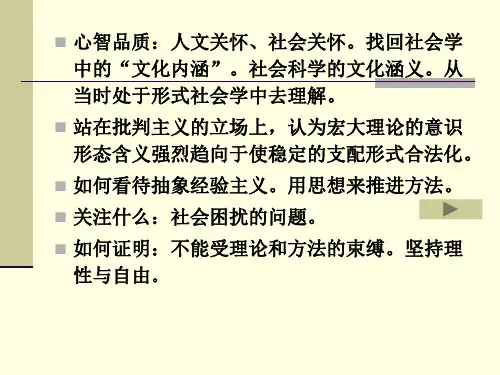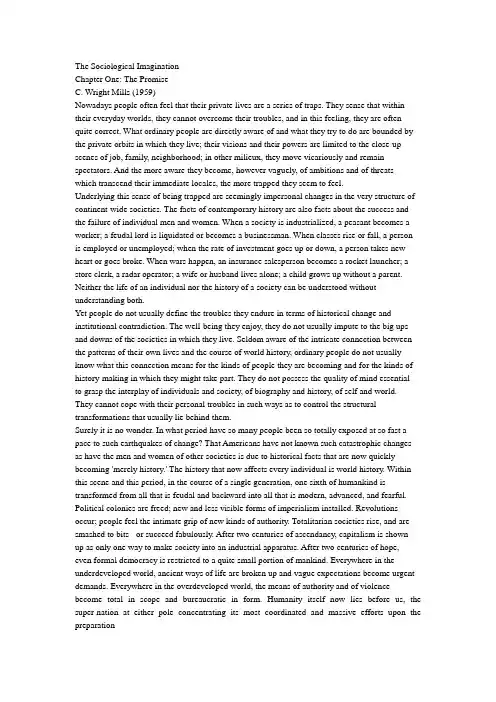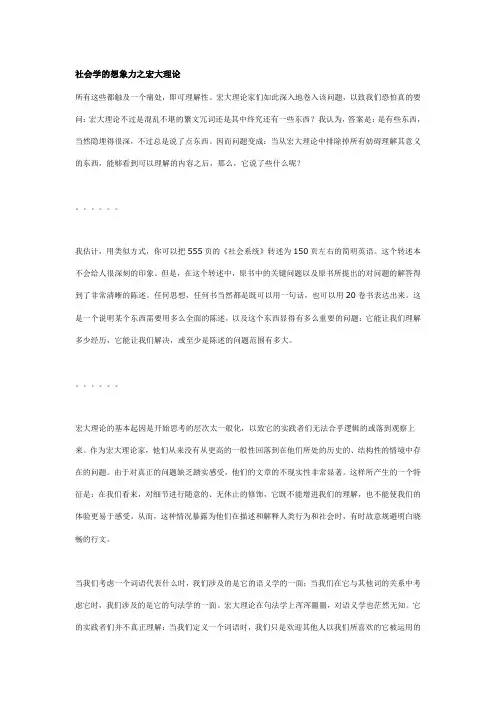2-宏大理论《社会学的想象力》-社会学考研必备课件
- 格式:ppt
- 大小:150.50 KB
- 文档页数:11




The Sociological ImaginationChapter One: The PromiseC. Wright Mills (1959)Nowadays people often feel that their private lives are a series of traps. They sense that within their everyday worlds, they cannot overcome their troubles, and in this feeling, they are often quite correct. What ordinary people are directly aware of and what they try to do are bounded by the private orbits in which they live; their visions and their powers are limited to the close-up scenes of job, family, neighborhood; in other milieux, they move vicariously and remain spectators. And the more aware they become, however vaguely, of ambitions and of threats which transcend their immediate locales, the more trapped they seem to feel.Underlying this sense of being trapped are seemingly impersonal changes in the very structure of continent-wide societies. The facts of contemporary history are also facts about the success and the failure of individual men and women. When a society is industrialized, a peasant becomes a worker; a feudal lord is liquidated or becomes a businessman. When classes rise or fall, a person is employed or unemployed; when the rate of investment goes up or down, a person takes new heart or goes broke. When wars happen, an insurance salesperson becomes a rocket launcher; a store clerk, a radar operator; a wife or husband lives alone; a child grows up without a parent. Neither the life of an individual nor the history of a society can be understood without understanding both.Yet people do not usually define the troubles they endure in terms of historical change and institutional contradiction. The well-being they enjoy, they do not usually impute to the big ups and downs of the societies in which they live. Seldom aware of the intricate connection between the patterns of their own lives and the course of world history, ordinary people do not usually know what this connection means for the kinds of people they are becoming and for the kinds of history-making in which they might take part. They do not possess the quality of mind essentialto grasp the interplay of individuals and society, of biography and history, of self and world. They cannot cope with their personal troubles in such ways as to control the structural transformations that usually lie behind them.Surely it is no wonder. In what period have so many people been so totally exposed at so fast a pace to such earthquakes of change? That Americans have not known such catastrophic changes as have the men and women of other societies is due to historical facts that are now quickly becoming 'merely history.' The history that now affects every individual is world history. Within this scene and this period, in the course of a single generation, one sixth of humankind is transformed from all that is feudal and backward into all that is modern, advanced, and fearful. Political colonies are freed; new and less visible forms of imperialism installed. Revolutions occur; people feel the intimate grip of new kinds of authority. Totalitarian societies rise, and are smashed to bits - or succeed fabulously. After two centuries of ascendancy, capitalism is shownup as only one way to make society into an industrial apparatus. After two centuries of hope, even formal democracy is restricted to a quite small portion of mankind. Everywhere in the underdeveloped world, ancient ways of life are broken up and vague expectations become urgent demands. Everywhere in the overdeveloped world, the means of authority and of violence become total in scope and bureaucratic in form. Humanity itself now lies before us, the super-nation at either pole concentrating its most coordinated and massive efforts upon the preparationof World War Three.The very shaping of history now outpaces the ability of people to orient themselves in accordance with cherished values. And which values? Even when they do not panic, people often sense that older ways of feeling and thinking have collapsed and that newer beginnings are ambiguous to the point of moral stasis. Is it any wonder that ordinary people feel they cannot cope with the larger worlds with which they are so suddenly confronted? That they cannot understand the meaning of their epoch for their own lives? That - in defense of selfhood - they become morally insensible, trying to remain altogether private individuals? Is it any wonder that they come to be possessed by a sense of the trap?It is not only information that they need - in this Age of Fact, information often dominates their attention and overwhelms their capacities to assimilate it. It is not only the skills of reason that they need - although their struggles to acquire these often exhaust their limited moral energy. What they need, and what they feel they need, is a quality of mind that will help them to use information and to develop reason in order to achieve lucid summations of what is going on in the world and of what may be happening within themselves. It is this quality, I am going to contend, that journalists and scholars, artists and publics, scientists and editors are coming to expect of what may be called the sociological imagination.The sociological imagination enables its possessor to understand the larger historical scene in terms of its meaning for the inner life and the external career of a variety of individuals. It enables him to take into account how individuals, in the welter of their daily experience, often become falsely conscious of their social positions. Within that welter, the framework of modern society is sought, and within that framework the psychologies of a variety of men and women are formulated. By such means the personal uneasiness of individuals is focused upon explicit troubles and the indifference of publics is transformed into involvement with public issues.The first fruit of this imagination - and the first lesson of the social science that embodies it - is the idea that the individual can understand her own experience and gauge her own fate only by locating herself within her period, that she can know her own chances in life only by becoming aware of those of all individuals in her circumstances. In many ways it is a terrible lesson; in many ways a magnificent one. We do not know the limits of humans capacities for supremeeffort or willing degradation, for agony or glee, for pleasurable brutality or the sweetness of reason. But in our time we have come to know that the limits of 'human nature' are frighteningly broad. We have come to know that every individual lives, from one generation to the next, in some society; that he lives out a biography, and lives it out within some historical sequence. By the fact of this living, he contributes, however minutely, to the shaping of this society and to the course of its history, even as he is made by society and by its historical push and shove.The sociological imagination enables us to grasp history and biography and the relations between the two within society. That is its task and its promise. To recognize this task and this promise is the mark of the classic social analyst. It is characteristic of Herbert Spencer - turgid, polysyllabic, comprehensive; of E. A. Ross - graceful, muckraking, upright; of Auguste Comte and Emile Durkheim; of the intricate and subtle Karl Mannheim. It is the quality of all that is intellectually excellent in Karl Marx; it is the clue to Thorstein Veblen's brilliant and ironic insight, to Joseph Schumpeter's many-sided constructions of reality; it is the basis of the psychological sweep of W. E. H. Lecky no less than of the profundity and clarity of Max Weber. And it is the signal of what is best in contemporary studies of people and society.No social study that does not come back to the problems of biography, of history and of their intersections within a society has completed its intellectual journey. Whatever the specific problems of the classic social analysts, however limited or however broad the features of social reality they have examined, those who have been imaginatively aware of the promise of their work have consistently asked three sorts of questions:(1) What is the structure of this particular society as a whole? What are its essential components, and how are they related to one another? How does it differ from other varieties of social order? Within it, what is the meaning of any particular feature for its continuance and for its change? (2) Where does this society stand in human history? What are the mechanics by which it is changing? What is its place within and its meaning for the development of humanity as a whole? How does any particular feature we are examining affect, and how is it affected by, the historical period in which it moves? And this period - what are its essential features? How does it differ from other periods? What are its characteristic ways of history-making?(3) What varieties of men and women now prevail in this society and in this period? And what varieties are coming to prevail? In what ways are they selected and formed, liberated and repressed, made sensitive and blunted? What kinds of `human nature' are revealed in the conduct and character we observe in this society in this period? And what is the meaning for 'human nature' of each and every feature of the society we are examining?Whether the point of interest is a great power state or a minor literary mood, a family, a prison, a creed - these are the kinds of questions the best social analysts have asked. They are the intellectual pivots of classic studies of individuals in society - and they are the questions inevitably raised by any mind possessing the sociological imagination. For that imagination isthe capacity to shift from one perspective to another - from the political to the psychological; from examination of a single family to comparative assessment of the national budgets of the world; from the theological school to the military establishment; from considerations of an oil industry to studies of contemporary poetry. It is the capacity to range from the most impersonal and remote transformations to the most intimate features of the human self - and to see the relations between the two. Back of its use there is always the urge to know the social and historical meaning of the individual in the society and in the period in which she has her quality and her being.That, in brief, is why it is by means of the sociological imagination that men and women now hope to grasp what is going on in the world, and to understand what is happening in themselves as minute points of the intersections of biography and history within society. In large part, contemporary humanity's self-conscious view of itself as at least an outsider, if not a permanent stranger, rests upon an absorbed realization of social relativity and of the transformative power of history. The sociological imagination is the most fruitful form of this self-consciousness. Byits use people whose mentalities have swept only a series of limited orbits often come to feel as if suddenly awakened in a house with which they had only supposed themselves to be familiar. Correctly or incorrectly, they often come to feel that they can now provide themselves with adequate summations, cohesive assessments, comprehensive orientations. Older decisions that once appeared sound now seem to them products of a mind unaccountably dense. Their capacity for astonishment is made lively again. They acquire a new way of thinking, they experience a transvaluation of values: in a word, by their reflection and by their sensibility, they realize the cultural meaning of the social sciences.Perhaps the most fruitful distinction with which the sociological imagination works is between 'the personal troubles of milieu' and 'the public issues of social structure.' This distinction is an essential tool of the sociological imagination and a feature of all classic work in social science. Troubles occur within the character of the individual and within the range of his or her immediate relations with others; they have to do with one's self and with those limited areas of social life of which one is directly and personally aware. Accordingly, the statement and the resolution of troubles properly lie within the individual as a biographical entity and within the scope of one's immediate milieu - the social setting that is directly open to her personal experience and to some extent her willful activity. A trouble is a private matter: values cherished by an individual are felt by her to be threatened.Issues have to do with matters that transcend these local environments of the individual and the range of her inner life. They have to do with the organization of many such milieu into the institutions of an historical society as a whole, with the ways in which various milieux overlap and interpenetrate to form the larger structure of social and historical life. An issue is a public matter: some value cherished by publics is felt to be threatened. Often there is a debate about what that value really is and about what it is that really threatens it. This debate is often without focus if only because it is the very nature of an issue, unlike even widespread trouble, that it cannot very well be defined in terms of the immediate and everyday environments of ordinary people. An issue, in fact, often involves a crisis in institutional arrangements, and often too it involves what Marxists call 'contradictions' or 'antagonisms.'In these terms, consider unemployment. When, in a city of 100,000, only one is unemployed, that is his personal trouble, and for its relief we properly look to the character of the individual, his skills and his immediate opportunities. But when in a nation of 50 million employees, 15 million people are unemployed, that is an issue, and we may not hope to find its solution within the range of opportunities open to any one individual. The very structure of opportunities has collapsed. Both the correct statement of the problem and the range of possible solutions require us to consider the economic and political institutions of the society, and not merely the personal situation and character of a scatter of individuals.Consider war. The personal problem of war, when it occurs, may be how to survive it or how to die in it with honor; how to make money out of it; how to climb into the higher safety of the military apparatus; or how to contribute to the war's termination. In short, according to one's values, to find a set of milieux and within it to survive the war or make one's death in it meaningful. But the structural issues of war have to do with its causes; with what types of people it throws up into command; with its effects upon economic and political, family and religious institutions, with the unorganized irresponsibility of a world of nation-states.Consider marriage. Inside a marriage a man and a woman may experience personal troubles, but when the divorce rate during the first four years of marriage is 250 out of every 1,000 attempts, this is an indication of a structural issue having to do with the institutions of marriage and the family and other institutions that bear upon them.Or consider the metropolis - the horrible, beautiful, ugly, magnificent sprawl of the great city. For many members of the upperclass the personal solution to 'the problem of the city' is to have an apartment with private garage under it in the heart of the city and forty miles out, a house by Henry Hill, garden by Garrett Eckbo, on a hundred acres of private land. In these two controlled environments - with a small staff at each end and a private helicopter connection - most peoplecould solve many of the problems of personal milieux caused by the facts of the city. But all this, however splendid, does not solve the public issues that the structural fact of the city poses. What should be done with this wonderful monstrosity? Break it all up into scattered units, combining residence and work? Refurbish it as it stands? Or, after evacuation, dynamite it and build new cities according to new plans in new places? What should those plans be? And who is to decide and to accomplish whatever choice is made? These are structural issues; to confront them and to solve them requires us to consider political and economic issues that affect innumerable milieux. In so far as an economy is so arranged that slumps occur, the problem of unemployment becomes incapable of personal solution. In so far as war is inherent in the nation-state system and in the uneven industrialization of the world, the ordinary individual in her restricted milieu will be powerless - with or without psychiatric aid - to solve the troubles this system or lack of system imposes upon him. In so far as the family as an institution turns women into darling little slaves and men into their chief providers and unweaned dependents, the problem of a satisfactory marriage remains incapable of purely private solution. In so far as the overdeveloped megalopolis and the overdeveloped automobile are built-in features of the overdeveloped society, the issues of urban living will not be solved by personal ingenuity and private wealth. What we experience in various and specific milieux, I have noted, is often caused by structural changes. Accordingly, to understand the changes of many personal milieux we are required to look beyond them. And the number and variety of such structural changes increase as the institutions within which we live become more embracing and more intricately connected with one another. To be aware of the idea of social structure and to use it with sensibility is to be capable of tracing such linkages among a great variety of milieux. To be able to do that is to possess the sociological imagination.。

米尔斯的《社会学的想象力》(1).其结构:稳定的社会互动系统——及社会结构——整合的本质,集中于行动者的动机和规范的文化标准间的整合,在我们的人际情境之中,这些文化标准把行动系统整合起来。
读书笔记:摘抄:1.社会学的想象力的第一个成果-一个思想,即个人的只有通过置身于所处的时代之中,才能理解他自己的经历并把握自身的命运,他只有变得知晓他所身处的环境中所有个人的生活机遇,才能明了他自己的生活机遇。
2.要让工人们快乐、高效、乐于合作,我们只需要让管理者们成为聪明、理性和博学的人。
…3.…由于工厂既是工作的地方,也是社会关系形成的地方,所以要定义士气,我们必须考虑客观和主观的尺度。
就角度而言,士气似乎意味着工人们愿意完成手中的工作,完成时心情很不错,甚至非常高兴。
就客观角度而言,则士气似乎意味着工作干得很有效率,大多数的工作是在最短时间内,用最少的钱以最小的困难完成。
所以,在现在的美国工厂,士气一定与工人快乐的服从有关,这种服从引起的结果是,管理者认为,工人在高效从事手中的工作。
4.对我所做的研究进行敏锐的检验。
5.…由于被社会化,他会为他人着想并友善地帮助他们;他不会愁思百结,顾影自怜;相反,他有些外向,踊跃参加社区的日常生活,帮助社区在一个可以调整的有序步伐下“取得进步”。
他加入很多的社区并为之服务。
即便不是十分投入的“参与者”,他当然也会不时的在外面瞅瞅。
他乐于服从传统的道德与动机。
高兴地投身受人尊重的制度的逐渐进步之中。
他的父母可不会离婚,他的家庭也不会无情地破裂。
他可真是“成功”,至少是以谦恭方式取得成功,因为他的进取意识也是很有分寸的;但是,对于过分超越自己能力的事情,他绝不会加以考虑,以免成为一名“脱离实际的思想家”。
作为一名处境尚可的小人物,他不奢求赚到大钱,他的品质太普通,所以我们说不出他们的意义。
…自我理解:进取意识有分寸,但有敢于想象,追求卓越,因为人会在挑战自己的过程中体会到莫大的快乐。




社会学的想象力之宏大理论所有这些都触及一个痛处,即可理解性。
宏大理论家们如此深入地卷入该问题,以致我们恐怕真的要问:宏大理论不过是混乱不堪的繁文冗词还是其中终究还有一些东西?我认为,答案是:是有些东西,当然隐埋得很深,不过总是说了点东西。
因而问题变成:当从宏大理论中排除掉所有妨碍理解其意义的东西,能够看到可以理解的内容之后,那么,它说了些什么呢?。
我估计,用类似方式,你可以把555页的《社会系统》转述为150页左右的简明英语。
这个转述本不会给人很深刻的印象。
但是,在这个转述中,原书中的关键问题以及原书所提出的对问题的解答得到了非常清晰的陈述。
任何思想,任何书当然都是既可以用一句话,也可以用20卷书表达出来。
这是一个说明某个东西需要用多么全面的陈述,以及这个东西显得有多么重要的问题:它能让我们理解多少经历,它能让我们解决,或至少是陈述的问题范围有多大。
宏大理论的基本起因是开始思考的层次太一般化,以致它的实践者们无法合乎逻辑的或落到观察上来。
作为宏大理论家,他们从来没有从更高的一般性回落到在他们所处的历史的、结构性的情境中存在的问题。
由于对真正的问题缺乏踏实感受,他们的文章的不现实性非常显著。
这样所产生的一个特征是:在我们看来,对细节进行随意的、无休止的修饰,它既不能增进我们的理解,也不能使我们的体验更易于感受。
从而,这种情况暴露为他们在描述和解释人类行为和社会时,有时故意规避明白晓畅的行文。
当我们考虑一个词语代表什么时,我们涉及的是它的语义学的一面;当我们在它与其他词的关系中考虑它时,我们涉及的是它的句法学的一面。
宏大理论在句法学上浑浑噩噩,对语义学也茫然无知。
它的实践者们并不真正理解:当我们定义一个词语时,我们只是欢迎其他人以我们所喜欢的它被运用的方式来运用它;定义的目的是让争论能集中于事实上,好的定义的应有结果是把对术语的争论转变为对事实的不同看法,从而掀起进一步研究所需的争论。
社会学的想象力之抽象经验主义。


《社会学的想象力》一、作者简介C·赖特·米尔斯(1916~1962),美国社会学家,文化批判主义的主要代表人物之一,生前任教于哥伦比亚大学社会学系。
米尔斯在知识社会学和美国社会阶层研究这两个方面都有杰出的成绩,代表作有《白领:美国中产阶级》(1951)、《权力精英》(1956)和《社会学的想像力》(1959)等。
50年代初他以《白领:美国的中产阶级》一举成名,而《社会学的想象力》是他生前的最后一部作品,也是他最重要的代表作。
二、全书概述《社会学的想象力》全书共分为十章,在第一章米尔斯简述了本书的核心观点:什么是社会学的想象力,以及社会学家应该如何想象。
在第二到六章,米尔斯考察了社会科学久而成习的一些偏向,展开了对社会科学研究的批判,主要涉及宏大理论、抽象经验主义与科层制。
在评述了社会科学发展的趋势后,在第七到十章,米尔斯提出了自己对未来社会学发展的展望,认为社会科学研究应该注重人的多样性、对历史的运用、理性与自由,以及应该保持独立自主的政治角色。
这本书的写作背景是两次世界大战之后,社会学的中心从欧洲移向了美国,芝加哥学派在美国独树一帜。
在米尔斯所处的时代,美国经济快速发展,美国社会科学得到了极大繁荣,同时许多社会学家跻身政府名门。
米尔斯表示,写作此书的目的是“要界定社会科学对于我们这个时代的文化使命所具有的意义。
具体确定有哪些努力在背后推动着社会学的想象力的发展,点明这种想象力对于文化生活以及政治生活的连带意涵,或许还要就社会学的想象力的必备条件给出一些建议。
通过这些方面来揭示今日社会科学的性质与用途,并点到即止地谈谈它们在美国当前的境况。
”总的来说,米尔斯认为,任何社会研究都应该探讨人生、历史以及两者在社会中的相互关联,他反对将社会科学当作一套科层技术,靠方法论上的矫揉造作来禁止社会探究,以晦涩玄虚的概念来充塞这类研究,或者只操心脱离具有公共相关性的议题的枝节问题,把研究搞得琐碎不堪。